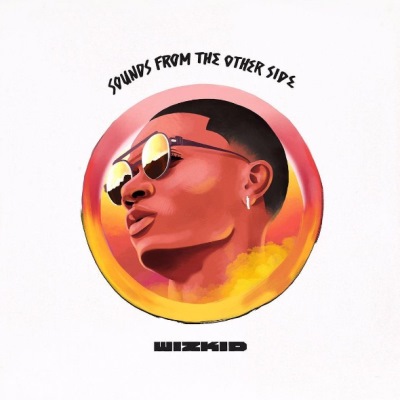You might not have noticed but Wizkid successfully turned a hot line into a whole EP, which, let’s be honest, really feels like an album. The Nigerian superstar ended his guest verse on Runtown’s “Bend Down Pause” by singing “they feel these sounds from the other side” and two years later, he’s serving those sounds to the rest of the world.
Sounds From the Other Side is Wizkid’s major label debut but it’s also his third solo project in six years. The EP is the Afropop singer’s official introduction to tens of thousands of new fans around the world but at the same time, it’s also an opportunity for those who were already familiar with his catalogue to reconnect with the music. Those two sets of listeners – the new side side and the ones on the other side – pick themselves, and your appreciation for the SFOS EP largely depends on which side you belong to.
The one drawback of SFOS is that the EP sells new listeners short in that it assumes everyone already knows who Wizkid is and how he got to where he is right now. There isn’t an autobiographical record in the mould of “Ojuelegba” like there was on the Ayo album or an introspective moment like “Oluwa Lo Ni” was for Superstar. However, if you’re still unsure as to why Wizkid is the best thing to come out of Africa since Nigerian jollof rice, SFOS still contains some brilliant answers. Besides being a living, singing inspiration that, using talent and hard work, we can all make it to the top of our respective fields regardless of how we started, Wizkid also embodies what it means to be young, fun and African.
The music on this EP is largely inspired by women – whether he grinds out wine-ready anthems like “Picture Perfect” or “Nobody”, or he hastens things up with club bangers like “Gbese” and “African Bad Gyal”, the music is ready-made to celebrate them. Yet, in having a good time, SFOS still retains Wizkid’s deep cultural roots. This respect for culture is most evident on records like “Sexy” where Wizzy recreates his idol Fela Kuti’s trademark call-and-response chorus or on “Sweet Love” where he samples his iconic “Shakara Oloje” to devastatingly good effect. This combination makes Wizkid’s music somewhat cathartic for a lot of Africans, as we sing and dance our million and one problems away, momentarily.
This is the ‘other’ side, which, as we’ve shown with the unfortunate case of D’banj, is happy that their favorite artist has gone international and all, but really just want the same music they’ve grown accustomed to. It was therefore imperative for Star Boy to retain the original architects of this sound, even as he incorporates the more globally familiar Caribbean vibes into his music in order for it to cross over. Thankfully, SFOS has a stellar cast of A-list Nigerian producers that he’s worked with extensively in the past, such as Sarz, Del B and Spellz, and features two gifted African singers in Ghana’s Efya and South African House music specialist Bucie.
Without these elements as the anchors for SFOS, Wizkid stands to lose both ways if, God forbid, this international experiment doesn’t go too well – and all it really takes for that disconnect to happen is a few missteps. Take “Daddy Yo”, for instance, a hyperactive dance track that struggled to fit into many local DJ’s sets because of the sparseness of the production and out-of-style reggeaton riddim. Dre Skull, a New York-based producer with a speciality in Caribbean music, produced “Daddy Yo”. In working with him, Wizkid tried to push the envelope, and he did, but the song didn’t last long on the top-end of the charts in Nigeria and it did not inspire copycat records in the manner that Wizzy’s music is known to do.
However, there are far more moments on SFOS where the synergy between the new side and, what Wizkid refers to as, the other side work, than moments where they don’t work. Star Boy seemed to understand which of his international artist friends fit the vibe of the project best and he worked with those artists repeatedly.
He seems to have found a musical sweet spot with Ty Dolla $ign in particular, and there’s an intriguing contrast between Wizkid’s clear voice and Ty’s husky tone on the records they did together. The Taylor Gang member is the only singer featured twice on SFOS, but “Naughty Ride” is Wizkid’s third collaboration with the cultural experiment of a group called Major Lazer, just like SFOS’ lead single, “Come Closer”, is his third time working with Drake. Wizkid doesn’t lose his identity on any of these songs in order to accommodate his more illustrious collaborators, nor do those artists sound like they recorded with Wizkid only for cross-promotional purposes or only in order to get a check – common mistakes African pop stars on the cusp of international success have made through the years.
SFOS is the real deal. African pop music has had a number of false starts at going global in the past but this ‘tape feels like an opportunity to make real progress collided with Wizkid’s preparedness to cross over, and now the singer has all it takes to go on and be successful.


